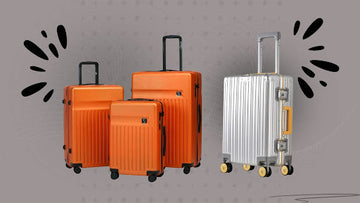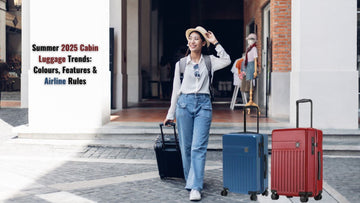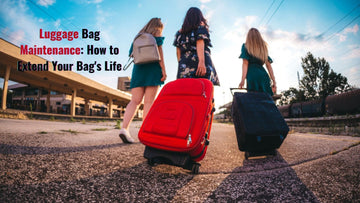When it comes to selecting the perfect travel luggage, understan
Trolleys or wheeled luggageding the materials used in their construction is crucial. This comprehensive review will delve into the key features, advantages, and disadvantages of polycarbonate vs aluminium trolley, helping you make an informed decision about the best trolley material for your needs.
Introduction to Trolley Materials
Trolleys, or wheeled luggage, are essential travel companions. The material of your trolley can significantly impact its durability, weight, and overall performance. Two popular materials in the market are polycarbonate and aluminium. Each has its unique properties that cater to different types of travelers.
Polycarbonate: Advantages and Disadvantages
Polycarbonate is a type of thermoplastic known for its durability and flexibility. It is commonly used in sided luggage and shell suitcases. Here are some of the key advantages and disadvantages of using polycarbonate shell for trolleys:
Advantages:
- Durability and Impact Resistance: Polycarbonate is highly resistant to impacts, making it an excellent choice for protecting your belongings during rough handling, especially in checked luggage.
- Lightweight: Despite its strength, polycarbonate is relatively lightweight, which is ideal for travelers who want to avoid excess baggage fees and easily lift their carry on luggage into overhead bins.
- Variety of Designs: It is available in various colors and designs, allowing for personalization and style.
- Heat Resistance: Polycarbonate can withstand high temperatures, ensuring the contents of your trolley remain safe.
Disadvantages:
- Cost: Polycarbonate trolleys tend to be more expensive than other materials like ABS or polypropylene.
- Scratch Prone: The surface can be prone to scratches, although these do not typically affect the structural integrity.
- Less Flexible: While durable, polycarbonate is less flexible than some other materials, which can make it harder to fit into tight spaces.
Aluminium: Advantages and Disadvantages
Aluminium suitcases are known for their sleek design and robustness. Let's explore their pros and cons in this travel luggage comparison:
Advantages:
- Strength and Durability: Aluminium trolley bags are renowned for its strength, making it highly durable and able to withstand significant wear and tear, whether used as checked bags or carry on bag.
- Aesthetic Appeal: The shiny, sleek finish of aluminium adds a touch of elegance and sophistication to your pieces of luggage.
- Weather Resistance: Aluminium is resistant to various weather conditions, ensuring your belongings stay dry and protected.
- Temperature Regulation: It reflects heat, keeping the contents cool even in hot environments.
Disadvantages:
- Weight: Aluminium trolleys are generally heavier than polycarbonate ones, which might be a concern for those mindful of weight restrictions.
- Dents and Scratches: Although robust, aluminium is susceptible to dents and scratches, which can affect its appearance over time.
- Cost: Aluminium trolleys are often more expensive, reflecting their premium luggage material and construction.
- Limited Packing Space: Due to their rigid structure, aluminium suitcases may offer less flexibility in terms of packing space compared to soft side luggage.
Key Differences Between Polycarbonate and Aluminium
|
Feature |
Polycarbonate Trolley |
Aluminium Trolley |
|
Durability |
Highly durable and impact-resistant |
Extremely strong and durable |
|
Weight |
Lightweight |
Heavier |
|
Design Variety |
Wide range of colors and styles |
Limited to metallic finishes |
|
Scratch Resistance |
Prone to scratches |
Prone to dents and scratches |
|
Cost |
Generally expensive |
More expensive |
|
Packing Space |
More flexible packing space |
Limited packing space |
|
Exterior Features |
May include exterior pockets |
Typically lacks exterior pockets |
Other Luggage Materials
While polycarbonate and aluminium are popular choices, there are other luggage materials worth considering:
- Ballistic Nylon: Known for its durability and resistance to tears, ballistic nylon is a strong fabric often used in soft side luggage.
- ABS: A lightweight and affordable plastic material, ABS is impact-resistant but may not be as durable as polycarbonate.
- Polypropylene: Another lightweight plastic option, polypropylene offers good impact resistance and is less expensive than polycarbonate.
Additional Luggage Features
When choosing a trolley, consider additional features that can enhance your travel experience:
- Spinner Wheels: Four multi-directional wheels allow for smooth maneuverability in any direction.
- Telescoping Handle: An adjustable handle that extends and retracts for comfortable pulling and easy storage.
- Exterior Pockets: Additional pockets on the outside of the luggage provide quick access to essential items.
- Expandable Capacity: Some trolleys feature expandable zippers that allow for extra packing space when needed.
Which is Better for Travelers?
Choosing between polycarbonate and aluminium luggage depends on your travel needs:
- Frequent Travelers: If you travel often and need a durable, lightweight option, polycarbonate may be the better choice due to its impact resistance and lighter weight.
- Style-Conscious Travelers: For those who prioritize style and durability, aluminium offers a sleek appearance and robust protection.
- Budget Considerations: While both materials can be costly, polycarbonate offers a balance of durability and weight, which can be more cost-effective in the long run.
- Type of Traveler: Business travelers may prefer the professional look of aluminium, while leisure travelers might appreciate the design options and lighter weight of polycarbonate.
Conclusion
Both polycarbonate and aluminium luggage trolley offer distinct advantages that cater to different preferences and needs. Polycarbonate provides a lightweight, durable option with a variety of design choices, while aluminium offers unmatched strength and a stylish finish. When making your decision, consider factors such as durability, weight, style, and cost, as well as additional features like spinner wheels, telescoping handle, and exterior pockets. Ultimately, the best trolley material depends on your specific travel requirements and personal preferences.
Your Questions Answered: Polycarbonate vs Aluminum Trolleys
Which is better, polycarbonate or aluminium?
Polycarbonate is better for lightweight and impact resistance, while aluminium is superior in strength and style. The choice depends on your travel needs.
Which is the best material for trolley bags?
Polycarbonate is often considered the best for its balance of durability and weight, but aluminium is preferred for its robustness and aesthetic appeal.
Is polycarbonate good for trolley bags?
Yes, polycarbonate is excellent for trolley bags due to its impact resistance and lightweight nature, making it ideal for frequent travelers.
What are the pros and cons of polycarbonate and aluminium luggage?
Polycarbonate is lightweight and durable but can scratch easily. Aluminium is strong and stylish but heavier and more prone to dents.
Are polycarbonate suitcases expensive?
Polycarbonate suitcases are generally more expensive than other materials like ABS, but their durability and design options often justify the cost.




